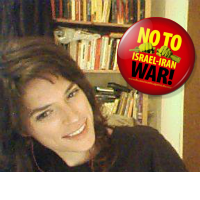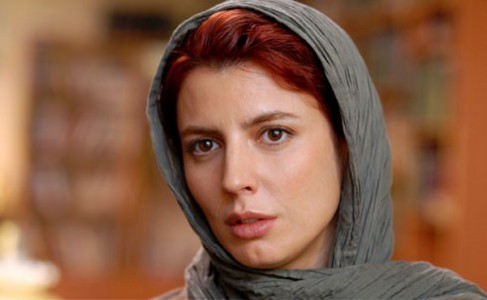The HyperTexts
Neria Biala

Neria Biala became a peace activist when, at the
urging of a friend, she attended a West Bank demonstration at Sheikh Jarrah in
East Jerusalem. The demonstration was a protest against the evictions of
Palestinians from their homes, a process that has been going on for more than 60
years, and which many peace and human rights activists around the globe consider
to be a blatant form of ethnic cleansing. In any case, Biala was shocked by
what she saw there: "What struck me the most was the violence; the army and the
police were extremely violent." Biala then embarked on a journey
of re-education. Now, with a new understanding of the conflict between the
Israelis and Palestinians, she sees Sheikh Jarrah as a microcosm of the Jewish
state's ills. She also sees participating in such protests as a step towards
safeguarding Israeli democracy. Biala believes that Israelis who are uninformed
and uninvolved are harming their country and endangering themselves, saying:
"It's suicide not to know what's really going on here."

Neria Biala does not subscribe to the idea that Jewish Israeli peace activists
are heroes, saying: "Please, you get it all wrong. Jewish Israeli protesters are placed
in an awkward position because even if they are proclaimed antizionists they
still represent the privileged oppressors. I therefore thank my Palestinian and
Israeli-Palestinian friends for allowing me to be present in the struggle. I'm
amazed by the utter lack of resentment against me each time it happens. The
sanctions against me as a Jewish Israeli are far lighter than the sanctions
against Israeli Palestinians (and other minorities), not to mention the
sanctions against Palestinians who live beyond the green line. I may be arrested
for one day, but Palestinians may be arrested for days, weeks, months and years.
It's all wrong to focus on Israelis in the struggle because Israelis who don't
participate in it are criminals. For Israelis it's a moral command and not so
much a matter of choice; there is nothing heroic in fulfilling one's duties."
She recommends the following sites to people who want to learn more about the wildly
unjust consequences for Palestinians who dare to express their desire for
true freedom, equality and justice:
http://www.stoptorture.org.il/en
http://www.yesh-din.org
http://www.hamoked.org/home.aspx

Neria Biala signed the letter below. It is the response of the Sheikh Jarrah
activists to the Elie Wiesel letter on
Jerusalem. She was joined by some of Jerusalem's
and Israel/Palestines's most prominent intellectuals, including philosopher Avishai Margalit
and Jewish studies
scholar Moshe Halbetal. The letter was also signed by Avraham "Avrum" Burg, a
former chairman of the Jewish Agency and World Zionist Organization, and a
former Speaker of the Knesset. Burg also served as interim President of Israel
for twenty days, after the retirement of Ezer Weizman. But Burg does not think
it is in Israel's best interests to deny equality and basic human rights to
Palestinians. In 2003 he lobbied for Israel to withdraw its occupying forces
from the West Bank, and on the subject of "terrorism" he said: "Israel, having
ceased to care about the children of the Palestinians, should not be surprised
when they come washed in hatred and blow themselves up in the centers of Israeli
escapism." To illustrate how dangerous it is to be a peace activist in
Israel/Palestine these days, Burg was wounded by a grenade while taking part in
the Peace Now demonstration in Jerusalem in February 1993. Another peace
activist, Emil Grunzweig, was killed in that demonstration.
Dear Mr. Wiesel,
We write to you from Jerusalem to convey our frustration, even outrage, at your
recently published letter on Jerusalem. We are Jewish Jerusalemites—residents
by choice of a battered city, a city used and abused, ransacked time and again
first by foreign conquerors and now by its own politicians. We cannot recognize
our city in the sentimental abstraction you call by its name.
Our Jerusalem is concrete, its hills covered with limestone houses and pine
trees; its streets lined with synagogues, mosques and churches. Your Jerusalem
is an ideal, an object of prayers and a bearer of the collective memory of a
people whose members actually bear many individual memories. Our Jerusalem is
populated with people, young and old, women and men, who wish their city to be a
symbol of dignity—not of hubris, inequality and discrimination. You speak of
the celestial Jerusalem; we live in the earthly one.
For more than a generation now the earthly city we call home has been crumbling
under the weight of its own idealization. Your letter troubles us, not simply
because it is replete with factual errors and false representations, but because
it upholds an attachment to some other-worldly city which purports to supersede
the interests of those who live in the this-worldly one. For every Jew, you say,
a visit to Jerusalem is a homecoming, yet it is our commitment that makes your
homecoming possible. We prefer the hardship of realizing citizenship in this
city to the convenience of merely yearning for it.
Indeed, your claim that Jerusalem is above politics is doubly outrageous. First,
because contemporary Jerusalem was created by a political decision and politics
alone keeps it formally unified. The tortuous municipal boundaries of today's
Jerusalem were drawn by Israeli generals and politicians shortly after the 1967
war. Feigning to unify an ancient city, they created an unwieldy behemoth,
encircling dozens of Palestinian villages which were never part of Jerusalem.
Stretching from the outskirts of Ramallah in the north to the edge of Bethlehem
in the south, the Jerusalem the Israeli government foolishly concocted is larger
than Paris. Its historical core, the nexus of memories and religious
significance often called "the Holy Basin", comprises a mere one percent of its
area. Now they call this artificial fabrication "Jerusalem" in order to obviate
any approaching chance for peace.
Second, your attempt to keep Jerusalem above politics means divesting us of a
future. For being above politics is being devoid of the power to shape the
reality of one's life. As true Jerusalemites, we cannot stand by and watch our
beloved city, parts of which are utterly neglected, being used as a springboard
for crafty politicians and sentimental populists who claim Jerusalem is above
politics and negotiation. All the while, they franticly "Judaize" Eastern
Jerusalem in order to transform its geopolitics beyond recognition.
We invite you to our city to view with your own eyes the catastrophic effects of
the frenzy of construction. You will witness that, contrary to some media
reports, Arabs are not allowed to build their homes anywhere in Jerusalem. You
can discover and see gross inequality in the allocation of municipal resources and
services between east and west. We will take you to Sheikh Jarrah, where
Palestinian families are being evicted from their homes to make room for a new
Jewish neighborhood, and to Silwan, where dozens of houses face demolition
because of the Jerusalem Municipality's refusal to issue building permits to
Palestinians.
We, the people of Jerusalem, can no longer be sacrificed for the fantasies of
those who love our city from afar. Our this-worldly Jerusalem must be shared by the
people of the two nations residing in it. Only a shared city will live up to the
prophet's vision: "Zion shall be redeemed with justice". As we chant weekly in
our vigils in Sheikh Jarrah: "Nothing can be holy in an occupied city!"
Respectfully,
Just Jerusalem (Sheikh Jarrah) Activists
1. Ada Bilu 2. Alon Harel 3. Amiel Vardi 4. Amit Lavi 5. Amit Miller 6. Amos
Goldberg 7. Ariela Brin 8. Assaf Sharon 9. Avichay Sharon 10. Avishai Margalit
11. Avital Abudi 12. Avital Sharon 13. Avner Inbar 14. Avrum Burg 15. Barbara
Spectre 16. Bernard Avishai 17. Daniella Gordon 18. Dani Schrire 19. Daniel Argo
20. Danny Felsteiner 21. Daphna Stroumsa 22. David Shulman 23. Diana Steigler
24. Dolev Rahat 25. Dorit Gat 26. Dorit Argo 27. Edna Ulman-Margalit 28. Eitan
Buchvall 29. Eli Sharon 30. Freddie Rokem 31. Galit Hasan-Rokem 32. Gideon
Freudenthal 33. Gil Gutglick 34. Guga Kogan 35. Guy Feldman 36. Hagit Benbaji
37. Hagit Keysar 38. Haya Ofek 39. Hillel Ben Sasson 40. Ishay Rosen-Zvi 41.
Itamar Shappira 42. Jonathan Yaari 43. Judy Labensohn 44. Judy Labensohn 45.
Julia Alfandari 46. Levi Spectre 47. Liran Razinsky 48. Maya Wind 49. Mical Raz
50. Michael Ritov 51. Miriam Farhi-Rodrig 52. Mirit Barashi 53. Mirit Barashi
54. Moshe Halbertal 55. Naama Baumgarten-Sharon 56. Naama Hochstein 57. Nadav
Sharon 58. Neria Biala 59. Nili Sharon 60. Noa Lamm-Shalem 61. Oded Erez 62.
Oded Na'aman 63. Ofer Neiman 64. Omri Metzer 65. Paul Mendes-Flohr 66. Peter
Lehahn 67. Phil Spectre 68. Ra'anan Alexandrowicz 69. Ram Rahat 70. Ray Schrire
71. Reuven Kaminer 72. Roee Metzer 73. Ronen Mandelkern 74. Roni Hammerman 75.
Sahar Vardi 76. Sara Benninga 77. Sharon Casper 78. Shir Aloni Yaari 79. Shir
Sternberg 80. Shlomi Segall 81. Silan Dallal 82. Silvia Piterman 83. Tal Shapira
84. Tamar Lehahn 85. Tamar Rappaport 86. Uri Bitan 87. Yafa Tarlowski 88. Yaron
Gal 89. Yaron Wolf 90. Yehuda Agus 91. Yonatan Haimovich 92. Yoram Gordon 93.
Yotam Wolfe 94. Yuval Drier Shilo 95. Zehava Galon 96. Zeev Sternhell 97. Zvi
Benninga 98. Zvi Mazeh 99. Zvi Schuldiner
The HyperTexts


